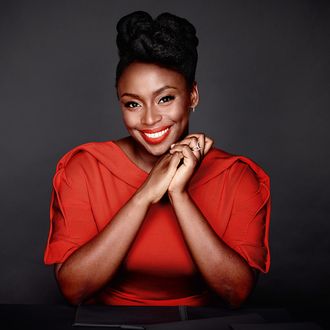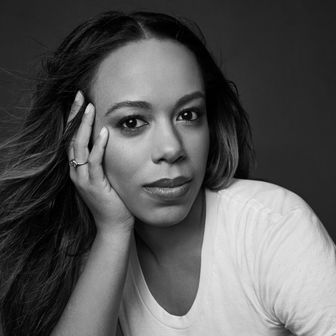
We probably don’t deserve Chimamanda Ngozi Adichie. The author and feminist who inspired Beyoncé is now fighting America’s political battles, and man is she good at it. But that’s not the only hat Adichie’s wearing as of late. She’s also the new face of No. 7 — a division of British drugstore retailer Boots, known for its cult serum that’s a best seller across the pond. (You can purchase the brand in the U.S. at Walgreens.)
The partnership between No. 7 and Adichie is a match that feels in sync. For years Adichie has been outspoken in asserting that feminism and makeup can co-exist, and the specific campaign she was tapped to lead for No. 7 hedges on the concept that cosmetics are more than tools to look pretty: They’re vessels to help a woman begin her day. The Cut talked to the author about her foray into the beauty business, the complex relationship she maintains with her hair, and the feminist lesson to be learned from the presidential election.
What frustrates you about the beauty industry? What gives you hope?
The beauty industry is more inclusive than it was ten years ago. There’s a slightly wider range of foundation shades, for example. What I find frustrating is that it should be even more inclusive. The definition of what is beautiful shouldn’t be so narrow. We should have different kinds of women — different body sizes, different shades of skin, and in a way that is consistent, not only occasional.
A note that struck a chord with me in your book Americanah is when Ifemelu, the novel’s protagonist, says, “Hair is the perfect metaphor for race in America.” What did you mean when you wrote that?
Hair is something we see, but we don’t understand what’s behind it, kind of like race. It’s the same way that something seems obvious, but it is really complicated and complex. For example, to see a middle-aged white woman who has highlights is not something everyone in the world necessarily understands, especially if it’s because she struggles to cover her grays. Or if you’re a black women, sometimes the way that your hair grows from your head isn’t considered “professional” by people who don’t know black hair. I don’t think it’s that people are malicious, I think it’s just some people don’t know what the hair that grows from the head of black women actually looks like.
How would you describe your relationship with your hair?
I don’t think we have enough time to talk about this. It’s interesting because I can say very excitedly now that I absolutely love my hair and I wouldn’t change it. But, it’s a relationship that has its ups and downs. There are times when I just don’t have the time for my hair and I let it be a matted mess. And there are times when I think of my hair as this glorious gift from God in all of its kinkiness. There are times when it’s frustrating and I go through a phase of having such a difficult time keeping the damn hair moisturized — it’s utter frustration. And there are other times when I’m having a really good day with my hair. I’m still looking for the perfect hair moisturizer.
Women can sometimes feel like they have to apologize for an interest in beauty, but you’ve said that women shouldn’t feel ashamed. Why was that important for you to say?
It’s the pitting of feminism against femininity — that they are mutually exclusive, that bothers me. It’s something that I really strongly reject. It’s problematic on many levels. You hear talk about women looking serious when they wear a power suit and if you wear a dress it doesn’t communicate power. Our definition of what normally comes across as powerful very much reflects male ideas, and the things our society traditionally considers masculine are not things that we generally think of as shallow or frivolous. The things that are considered traditionally feminine are considered shallow and frivolous, like beauty and fashion. There are many intelligent, thoughtful, innovative women who are interested in beauty and fashion, and we shouldn’t have any judgment about that.
The concept of self-care is more popular than ever. Do you think there is a viable connection between practicing self-care and beauty?
It’s very clichéd to say, but the greatest form of beauty is being well; mentally, physically, and emotionally well. I like makeup very much, but I also really like my face when I take my makeup off. I like to dress up, but I also really like myself when I’m not dressed up. I like taking long walks, I like nature, I like eating well, I’m happy when I’m exercising. It’s also true what all the magazines say, which is when you’re healthy, your skin actually looks better. So yes, there is a connection. Mental, emotional, and physical health are extremely important things. Particularly today when we sort of live in this stressful modern world where everything is fast.
What makes up your skin-care routine?
The person to talk to about my skin is my mother. My mother has very beautiful skin and she passed it on to her children. I have friends who make fun of me and say that I use all kinds of sleeping potions that I don’t want to tell them about, but actually I don’t. One reason I said yes to this campaign was because I had used Boots’ products in the past, so I knew they were good, and one of the things I used and loved was their No. 7 serum. The thing about Boots No. 7 is that there’s a form of democratic ethics at hand; they are good products that are affordable and somehow work with everyone. Additionally, I’ve always used Vaseline and cocoa butter. My forehead is oily and the rest of my skin is dry, so I’m constantly looking for moisture that’s dense and creamy. Right now I’m using a raw shea butter from Nigeria.
You’ve talked about how your mother has been a huge influence on your relationship with beauty and fashion. Are there any other women you admire when it comes to beauty and style?
Because I’m a writer and I’m always looking for material, I watch people. I admire ordinary women. I don’t mean that to sound mean. I’ll see a woman and how lovely she looks and well-put together and that really inspires me. My sister Uche is also an inspiration. She’s very stylish, very confident, very fashionable, very beautiful. I admire Solange Knowles’s style. Her hair, her face, her fashion, she’s very striking. My friend Thandie Newton is stunning. I just love her makeup because she looks like herself, if that makes sense. I love Michelle Obama, her makeup is on point. The director Ava DuVernay, I love her whole look, her hair. I love Kerry Washington — she’s also my friend — I adore her makeup and style.
Is there any sort of lesson we can learn from our most recent election and how it relates to feminism?
I really think that sexism was a central factor in the election — in the way that Hillary Clinton was covered, and the way her public image was constructed. We need to ask different questions. We need to push back at perceived wisdom. It became quite mainstream to ask the question about sexism, there are lots of places that covered that, and then there were people who said that it can’t possibly be sexism because she’s so perfect. Hillary Clinton was put into a corner to say she’s not perfect. To me that was just as bad, because who is perfect?
This interview has been edited and condensed.





